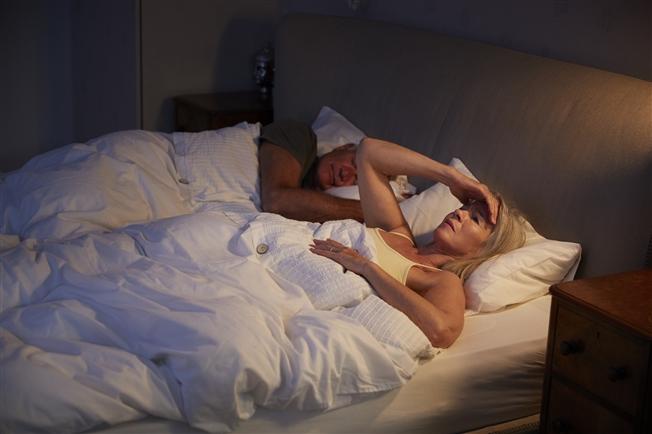Seven ways to get better sleep during menopause

Menopause can be a difficult transition. For the first time in their lives, many women can be up against physical or emotional changes that can affect their quality of life, including abnormal bleeding, painful intercourse, migraines and memory issues. One issue that’s especially prevalent? Changes in sleep patterns and newly-developed sleep disorders.
More than half of menopausal women have reported the onset of sleep problems, including insomnia, sleep apnea, snoring and restless leg syndrome. The physical discomforts of menopause—like hot flashes and sweating—can also impact sleep quality.
“During menopause, your ovaries produce fewer of the hormones estrogen, progesterone and testosterone. These changing hormone levels contribute to menopause symptoms like hot flashes, urinary incontinence and poorer sleep quality,” explains Beverly Vaughn, MD, gynecologist at Lankenau Medical Center, part of Main Line Health.
But between busy days spent juggling careers and personal commitments, few women have the time or the willingness to sacrifice an evening of quality sleep. If your sleep quality has suffered during menopause, there are a few things you can do to take back control of sleepless nights.
Hormone therapy (HT)
Hormone therapy (HT) has been offering women relief from their menopause symptoms for decades by replenishing the estrogen and progesterone levels in their body. While HT is typically reserved for women who are experiencing moderate to severe hot flashes and night sweats, curbing these symptoms can—in turn—improve your sleep.
However, HT is not without risks in certain women. The treatment method has been linked to an increased risk for blood clots, heart attack, stroke, breast cancer and gall bladder disease.
“HT is not appropriate for everyone, and wouldn’t be recommended to a woman who has medical history increases their risk of these conditions. It’s best used in women who are close to their age of menopause, as older women may have more risks,” says Dr. Vaughn. “For women who do pursue HRT, we work closely to ensure treatment doesn’t negatively affect her health.”
Allow for quiet time before bed
Have you ever spent the night tossing and turning—and thinking of your to-do list? Many women report difficulty “turning their mind off” at night. To help, try reserving time for a quiet, calming activity before bed, like practicing mindfulness, gentle yoga or reading and enjoying a cup of hot tea. These can help ease you into sleep, rather than making a quick transition from a busy day immediately into bedtime. “Make sure to avoid screen time later in the evening as the light from these devices will also interfere with sleep,” cautions Dr. Goldberg.
You might also keep a notepad and pen next to your bed to help you jot down thoughts that may come to you in the middle of the night. This can help you manage your to-do list manually—not mentally.
Create a cool sleep environment
Where you sleep can make a big difference in how you’re sleeping. If hot flashes are keeping you up at night, make changes to help cool down your sleep environment. Buy a small fan for your bedside table or open the windows to allow for better air flow. Other options, like cooling pillows and moisture-wicking clothing, can help alleviate your symptoms without affecting a sleeping partner.
Exercise—but not too soon before bed
Exercise is good for your health, but it’s also good for your sleep. You might even be surprised that a workout can actually help cool you down.
“Exercising in the morning or early afternoon helps manage your sleep-wake cycle by slightly increasing your body temperature in the hours following your workout and then gradually dropping it,” explains Rochelle Goldberg, MD, director of sleep medicine services at Main Line Health. “For optimal benefits, aim to fit in a workout midday.”
If you can’t take a break from a busy day to work out, that’s okay. Try exercising in the early evening, at least three hours before your bedtime. You’ll still reap the benefits.
Limit heavy meals
After a big meal or a few drinks, you might feel like you’re ready to fall asleep. But don’t let this feeling fool you—heavy meals, alcohol and caffeine can all hinder your sleep. If you’re planning on a big meal, try to schedule it for late afternoon or early evening so it doesn’t impact your sleep.
Keep your sleep schedule consistent
If you often have trouble falling asleep or staying asleep at night, it might sound like a no-brainer to sleep in on the weekends or sneak in a nap when you can. But it turns out that these patterns can actually worsen the problem.
“An irregular sleep schedule—whether it’s napping during the day or staying up too late at night will create more disturbed sleep and potentially longer wakes,” explains Dr. Goldberg. “As much as possible, it’s important to maintain a regular sleep schedule, even on weekends and vacations.”
Don’t delay seeking care
The bottom line? If menopause has disrupted your sleep, don’t delay seeking care. Left untreated, sleep disorders or changes to your sleep habits can have long-term consequences for your health, including an increased risk for weight gain, heart disease, diabetes and depression.
“Just because your sleep patterns change during menopause doesn’t mean this needs to become your new normal,” says Dr. Goldberg. “Make an appointment with your health care provider to talk to them about your symptoms and discuss your treatment options.”
Main Line Health serves patients at hospitals and health centers throughout the western suburbs of Philadelphia. To schedule an appointment with a specialist at Main Line Health, call 1.866.CALL.MLH (225.5654).
 Content you want, delivered to your inbox
Content you want, delivered to your inbox
Want to get the latest health and wellness articles delivered right to your inbox?
Subscribe to the Well Ahead Newsletter.
